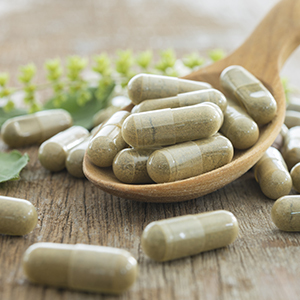Vitamin B12 is an essential vitamin that’s necessary for good health. Your body cannot naturally produce it. However, vitamin B12 is commonly available in various foods and supplements. If you’ve been searching for a B12 supplement, you might have seen many scientific-sounding ingredients that aren’t fully explained. The entire process of finding a good quality supplement can be exhausting!
One ingredient you’ll run into if you’re looking for a B12 product is cyanocobalamin. But, just because it’s available for purchase, does that mean it’s safe, natural, and effective? Watch my video or read the transcription below to learn the basics on cyanocobalamin and if you should avoid it.

Vitamin B12 | What Is Cyanocobalamin?
Length: 3 minutes
What Is Cyanocobalamin?
Simply put, cyanocobalamin is a synthetic form of vitamin B12. It’s more or less a generic, man-made form. There are four types of vitamin B12: methylcobalamin, adenosylcobalamin, hydroxocobalamin, and cyanocobalamin.
While methylcobalamin and adenosylcobalamin are active natural forms, hydroxocobalamin and cyanocobalamin are synthetic forms of vitamin B12. Because it can be cheaply made, cyanocobalamin is perhaps the most commonly used type of B12 for supplements. In technical terms, cyanocobalamin is a cyanide molecule attached to a cobalamin molecule.
Is Cyanocobalamin Good for You?
I do not recommend cyanocobalamin. I always tell people, the B12 test is an easy test to know if the vitamin or supplement that you're taking is good or not. Look at the ingredients on anything you have; if you see cyanocobalamin listed, you know automatically that it’s a cheaply-made product, it’s not good for you, and there are better options.
People have a hard time reading ingredients and they don’t know what the difference is between let’s say vitamin E and d-alpha tocopherol (its scientific name). On a supplement label, you might see d-alpha tocopherol succinate, which is how this deception works.
A lot of times pharmaceutical and dietary supplement companies apply official-sounding names to synthetic molecules in an attempt to fool people into thinking the ingredients are beneficial. They count on people not knowing the difference. Unfortunately, some of the most widely distributed supplements you’ll find at drugstores and grocery stores are cheaply made and mostly comprised of synthetic compounds.
What Else to Look for on Your Supplement Label
Depending on the supplement you’re checking and the ingredients it contains, you can double-check the B12 test with a calcium test. Does the label indicate that the product contains calcium carbonate? If so, beware! Calcium carbonate is nothing more than chalk, and it clogs up your system.
So I recommend looking for cyanocobalamin and calcium carbonate on your label and avoid them. Cyanocobalamin, by definition, is actually a cyanide molecule attached to a cobalamin molecule, which is not good for you and your body has a hard time breaking it down.
The body wants the active forms of B12 — methylcobalamin and adenosylcobalamin. What we’ve found is that no matter what source of B12 you’re consuming with food, it’s still hard for people to break down!
But, in the normal biochemical process, if the body breaks down B12, it's going to break it down into two molecules, which is methylcobalamin and adenosylcobalamin.
And that's why we use those two active forms — adenosylcobalamin and methylcobalamin — in our B12 formula. You don’t have to metabolize it or break it down. That’s already done, and it’s able to go straight into your system.
Points to Remember
Vitamin B12 offers many health benefits, ranging from boosting your energy and metabolism to keeping your cells and brain healthy.
It’s an essential vitamin so make sure that any supplement you choose has the most bioavailable forms of B12 — methylcobalamin and adenosylcobalamin. Cheaply made, lesser products typically use cyanocobalamin, which is synthetic and far less effective. Think of it like flying in a luxury jet versus riding a bicycle with a flat tire and broken handlebars. There’s no comparison.
If you are looking for a high-quality, plant-based B12 supplement, try our B12. It’s our bioavailable B12 formula that contains methylcobalamin, adenosylcobalamin, and hydroxocobalamin so your body can use it efficiently, effectively, and quickly.
†Results may vary. Information and statements made are for education purposes and are not intended to replace the advice of your doctor. If you have a severe medical condition or health concern, see your physician.






